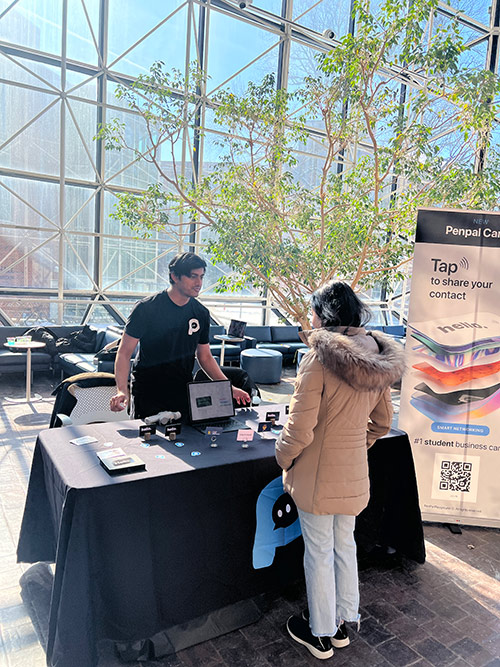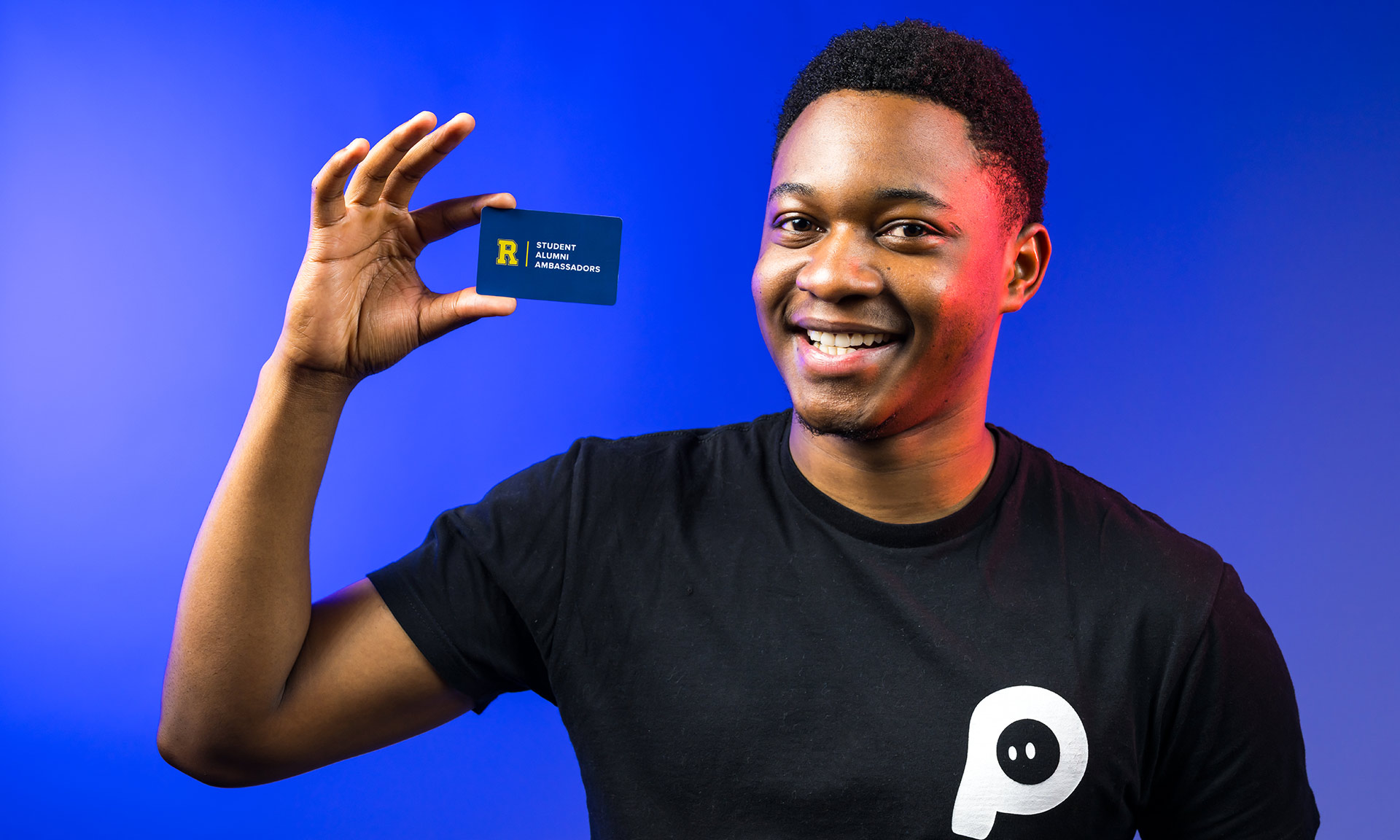Four juniors and one graduate are behind Penpal, the first digital business card created by students for students.
Ameenul (Gem) Haque ’26 was amazed by the frenzied networking that took place at the Society of Asian Scientists and Engineers conference in Boston last fall.
“It was really fast-paced, and the recruiters just wanted to know if you were a perfect fit for their companies or not,” he says. “They collected a pile of résumés, put all those papers on a table, and moved on.”
Haque had a different plan. The computer science and digital media studies double major tapped his Penpal digital business card on the smartphones of about 30 recruiters. In an instant, his résumé, LinkedIn profile, research projects, and portfolio were transferred.
“The recruiters were super impressed,” he says. “It was convenient and quick, and it made me stand out.”
Haque is one of four University of Rochester students and one alumnus who developed Penpal, joining Tamuda Chimhanda ’26, Lizmairi Vargas Santa ’26, Alessio Simoya ’22, and Meghna Tetambe ’25S (MBA). Haque, Chimhanda, and Vargas Santa met as recipients of the Handler Scholarship, the premier scholarship award at the University.
While digital business cards are not new, Penpal’s founders say their product is unique. “It’s created by students for students, and we’ve developed features that allow students to show their most important information,” Vargas Santa says. “Our passion is helping students just like us.”

Making the networking experience ever better
Penpal was formed in September 2022, when its founders saw a need for a better way to network.
“Most of us had been attending conferences recruiting for internships, and all we saw at each station was a large deck of business cards,” says Chimhanda, a computer science major from Zimbabwe. “We figured a digital business card would be a quick way of exchanging information and making us stand out.”
The Handler Scholarship
The Alan and Jane Handler Scholarship offers complete financial support to academically qualified students who have overcome significant obstacles in their lives. Scholars are selected on the basis of academic excellence, outstanding potential to be future leaders, and demonstrated mastery of complex challenges.
Penpal is powered by near field communication (NFC), a short-range wireless technology that allows devices to exchange data using radio waves. The cards, which retail online for $19.99, are manufactured in China, with the embedded NFC chips using the same technology that exists for tap-to-pay credit cards and Apple Pay.
Each cardholder sets up a profile on their smartphone and then can share information with any other smartphone—all with a simple tap. There’s also a QR code for those who prefer that method. At any point, Penpal users can modify the information they want others to receive. (See a demonstration.)
In addition to allowing users to share their résumé, portfolio, and other important items, Penpal comes with tools such as résumé tailoring to help improve a person’s résumé.
Establishing a business—one tap at a time
Penpal’s value as a student networking tool hasn’t gone unnoticed. The start-up captured first place at the 2023 Mark Ain Business Model Competition, sponsored by the University’s Ain Center for Entrepreneurship and Innovation. In 2024, Penpal won the Global Student Entrepreneur Award for Western New York.
The company’s first taste of success came in March 2024 at the National Society of Black Engineers convention in Atlanta, with more than 100 cards sold in one day. But its largest clients have been two career centers on the University’s River Campus.

LaTanya Johns, assistant dean at Simon Business School’s Benet Career Management Center, ordered 350 cards to aid Simon students in their job-seeking efforts. She says traditional business cards have lost favor due to COVID-19, which made people less inclined to pass paper back and forth. Penpal is a quicker, safer, and eco-friendly alternative.
“QR codes have become a more acceptable means of sharing and transferring information, and Penpal has expanded on that by allowing the cardholder to transfer their contact information and other pertinent information,” Johns says. “We’re excited to offer the cards to our students.”
The Greene Center for Career Education and Connections also purchased 100 Penpal cards to give away as prizes at signature events. Executive director Jodyi Wren says networking is a “crucial part” of career education, helping students navigate internship and job searches.
“We’re committed to supporting our students and their entrepreneurial pursuits while making networking more approachable and less intimidating,” she says. “Penpal gives students a practical tool to build and maintain their professional connections.”
Caleb Jakes ’26, a business and English double major from Newark, New Jersey, received a Penpal card at a recent Greene Center event and says it’s a game changer.
“It’s an effective tool for networking because it provides a sense of efficiency and reliability to the user,” says Jakes, who finds the card allows him to stand out at conferences. “I connect with highly successful entrepreneurs and business owners. I tap their phone, and they are in love with the efficient and unique way we exchange information.”
Building for the future, in Rochester and beyond
Because digital business cards are a competitive market, the Penpal team is constantly working to differentiate their product. This year, they created a feature that allows a user’s contact information to go directly to a recruiter’s inbox for later viewing.
“Say you’re networking in a fast-paced environment, and you’ve only got two minutes,” Chimhanda says. “I tap my card, and the recruiter can have it sent to their email, with a photo of the student and a summary of their profile. After meeting more than 100 students, you’ve probably forgotten who someone is.”
The Penpal team also regularly discusses the company’s future, including the immediate goal of reaching out to career centers at local and national colleges.
“Ultimately, Penpal has to become a household tool across universities,” Tetambe says. “We hope to eventually grow into a full-suite software company that supports students across different parts of their transition from academics into professional careers—things like interview prep tools and résumé building.”
While it may take some convincing to get students to ditch the old-fashioned way of networking—an emailed or printed résumé—in favor of the newest technology, Tetambe and her cofounders are up for the challenge.
“It’s never easy stepping out of your comfort zone,” she says. “But tools like the Penpal card allow job candidates to showcase their skills in a more dynamic and engaging way. And it’s certainly a great conversation starter!”





